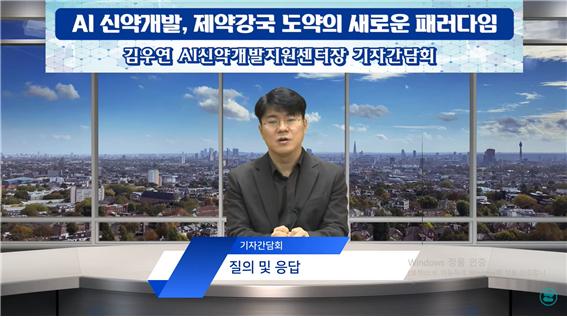New drug development using artificial intelligence (AI) has become a major trend in the global pharmaceutical industry, but some question the feasibility of such efforts.
Industry officials said AI would help save cost and time for drug development and raise the chance of commercialization. Yet, no AI-powered drugs have been approved so far.

Still, leading pharmaceutical companies are speeding up AI-based new drug development because they think it will be only a matter of time before they commercialize such medicine.
On Wednesday, the Korea Pharmaceutical and Bio-Pharma Manufacturers Association (KPBMA) held a news conference on “AI-based New Drug Development, A New Paradigm to Become Pharmaceutical Powerhouse.”
At the conference, Kim Woo-youn, who took office as head of the Korea AI Center for Drug Discovery and Development (KAICD) early this month, spoke on the prospects for AI-powered drug development and how he will operate the center. Kim is a chemistry professor at KAIST.
Kim opened his speech by mentioning that new drug development is a business area with a great impact on society. Still, costly and time-consuming R&D for a new drug is a big hurdle for Korean drugmakers. Under this circumstance, using AI to maximize the efficiency of R&D has become a key future strategy in the pharmaceutical sector, he said.
Kim predicted that AI would minimize uncertainty, time, and drug development costs by discovering candidate substances, designing pre-clinical and clinical trials based on biometric data such as genomes, and deriving the optimal patient group.
As Kim predicted, both the public and private sectors are actively developing and investing in AI-based drugs.
According to AI Center, 38 Korean startups specialize in AI-backed drug development, and 14 of them attracted 170 billion won ($140.5 million) investment in the first half of 2021.
The government actively supports AI use in the pharmaceutical industry through 27 projects.
Over 30 drugmakers are developing their AI-based drugs or collaborating with AI companies.
Kim noted that the Korean AI new drug development market was still in its infancy and undergoing trials and errors.
He said that for the industry to move forward, there should be more active collaboration between the AI technology sector and the new drug development sector, professional manpower training, and data construction.
“The Korean AI drug development market is not progressing in collaborative work. The cause of the problem lies in the matching of AI solutions,” Kim said. “AI-based drugs are often called solutions or platforms. However, we can check their performance only when we test them. So, it is difficult for drugmakers to predict whether AI solutions provide desired technology and performance.”
From the perspective of AI companies, it isn't easy to prove the value of their AI solutions in advance. Thus, many AI technologies and the demand for new drug development often mismatch, and joint research ends up disappointing for both sides, he added.
According to Kim, KAICD will release an AI platform for new drug developers to overcome this issue.
The move aims to help doctors, pharmacists, and research chemists easily utilize the AI platform on the web and have positive experiences with AI-based new drug development. In addition, these experiences will spur active matching between AI companies and pharmaceutical firms, he said.
If Korean drugmakers use this AI platform to discover effective substances, they will save costs on introducing an expensive foreign software.
KAICD will also strengthen the “Convergence AI Drug Development Expert Training” project to nurture professionals. The center will open a customized learning program and a field training course this year to relieve the shortage of AI experts in new drug development, Kim said.
To improve AI solutions’ performance and accuracy, it is essential to secure massive data related to compounds, omics, literature, and clinical information. However, it is not easy in Korea to secure many health data because they are highly sensitive, and people worry about personal information and technology leakage.
“Public institutes, medical institutes, and pharmaceutical companies use their data in closed manners. Therefore, the government should develop a plan to link public agencies’ big data, hospitals’ medical data, and drugmakers’ clinical data,” Kim said.
The slow growth of the local AI drug development market is not attributed to a lack of advanced technologies, he went on to say.
Recently, Korean companies, universities, and research institutes published many AI-related papers at prestigious international conferences, which means that the advanced level of Korean AI technologies is being recognized globally.
“So, the slow growth of AI-based drug development in Korea is the lack of collaboration between AI companies and pharmaceutical firms.”
Kim said domestic new drug development technology developers using big data and AI were not much behind global leaders.
“If we combine drug companies’ new drug development capabilities with IT companies’ AI technologies, we can win,” he said. “KAICD will focus its efforts on promoting such collaborative business.”

